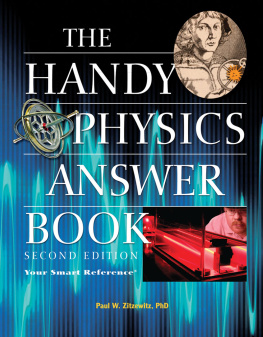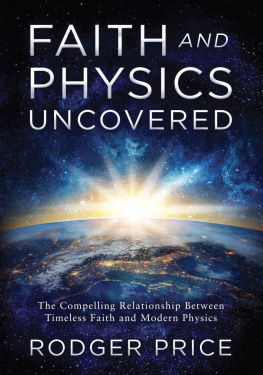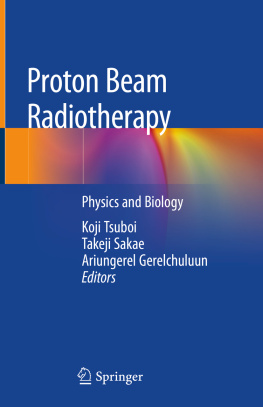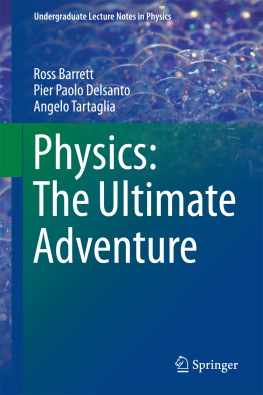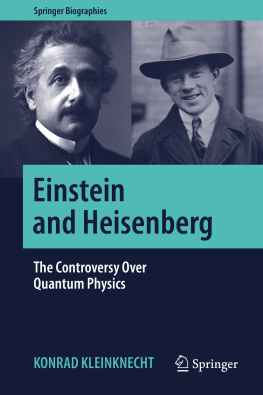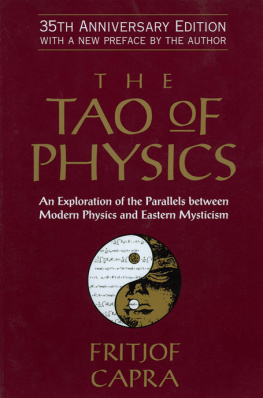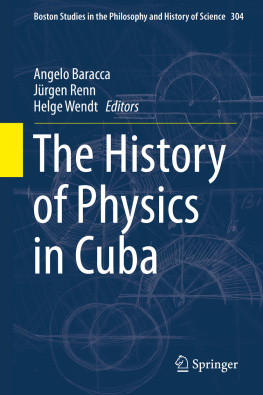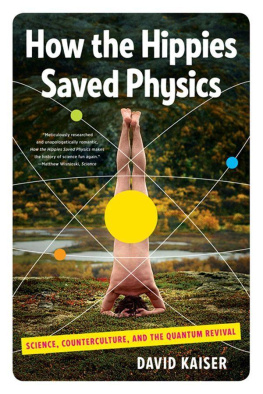Paul Buckley - A Question of Physics: Conversations in Physics and Biology
Here you can read online Paul Buckley - A Question of Physics: Conversations in Physics and Biology full text of the book (entire story) in english for free. Download pdf and epub, get meaning, cover and reviews about this ebook. year: 2016, publisher: University of Toronto Press, genre: Religion. Description of the work, (preface) as well as reviews are available. Best literature library LitArk.com created for fans of good reading and offers a wide selection of genres:
Romance novel
Science fiction
Adventure
Detective
Science
History
Home and family
Prose
Art
Politics
Computer
Non-fiction
Religion
Business
Children
Humor
Choose a favorite category and find really read worthwhile books. Enjoy immersion in the world of imagination, feel the emotions of the characters or learn something new for yourself, make an fascinating discovery.

- Book:A Question of Physics: Conversations in Physics and Biology
- Author:
- Publisher:University of Toronto Press
- Genre:
- Year:2016
- Rating:3 / 5
- Favourites:Add to favourites
- Your mark:
- 60
- 1
- 2
- 3
- 4
- 5
A Question of Physics: Conversations in Physics and Biology: summary, description and annotation
We offer to read an annotation, description, summary or preface (depends on what the author of the book "A Question of Physics: Conversations in Physics and Biology" wrote himself). If you haven't found the necessary information about the book — write in the comments, we will try to find it.
This book contains interviews with physicists, biologists, and chemists who have been involved in some of the most exciting discoveries in modern scientific thought.
Paul Buckley: author's other books
Who wrote A Question of Physics: Conversations in Physics and Biology? Find out the surname, the name of the author of the book and a list of all author's works by series.
A Question of Physics: Conversations in Physics and Biology — read online for free the complete book (whole text) full work
Below is the text of the book, divided by pages. System saving the place of the last page read, allows you to conveniently read the book "A Question of Physics: Conversations in Physics and Biology" online for free, without having to search again every time where you left off. Put a bookmark, and you can go to the page where you finished reading at any time.
Font size:
Interval:
Bookmark:
DR PAUL BUCKLEY is a physical chemist with the Science Policy Secretariat, Government of Saskatchewan.
DR F. DAVID PEAT is a physicist, writer, and film-maker.
This book contains interviews with physicists, biologists, and chemists who have been involved in some of the most exciting discoveries in modern scientific thought. The conversations with Bohm, Pattee, Penrose, Rosen, Rosenfeld, Somorjai, Weizscker, Wheeler, and Nobel prizewinners Heisenberg, Dirac, and Prigogine explore issues which have shaped modern physics and those which hint at what may form the next scientific revolution.
The discussions range over a set of basic problems in physical theory and their possible solutions the understanding of space and time, quantum and relativity theories and recent attempts to unite them and deal with related questions in theoretical biology. The approach is non-technical, with an emphasis on the assumptions of modern science and their implications for understanding the world we live in.
The book, which originated in a highly successful radio series, provides a vivid first-hand account of some of the astounding and perplexing developments in modern science, a rare overview that will intrigue the informed non-scientist and the scientist alike.
Conversations in
Physics and Biology
CONDUCTED BY PAUL BUCKLEY AND F. DAVID PEAT

University of Toronto Press 1979
Toronto Buffalo London
Printed in Canada
Library of Congress Cataloging in Publication Data
Buckley, Paul, 1938
A question of physics.
1. Physicists Interviews. 2. Biologists Interviews.
I. Peat, F. David, 1938-joint author.
II. Title.
QC 15. B 8 530 78-8096
ISBN 0-8020-2295-2
ISBN 0-8020-6331-4 pbk.
Publication of this book has been assisted by the
Canada Council under its block grant program
TO OUR PARENTS
This book contains interviews with physicists, biologists, and chemists who have been involved in some of the most exciting discoveries in modern scientific thought. Some time ago we approached the Canadian Broadcasting Corporation with a proposal for a series of radio programs in which the revolutions taking place in physics during the last fifty years could be explored. The series would attempt to re-create the elation and argument, the disappointment and confusion, which physicists experienced during the origins of the quantum theory, along with some of the more exciting developments in quantum and relativity theories. By presenting science through the voices of its practitioners we hoped to convey a vivid, if at times unpolished, first-hand account. The resulting interviews are the origin of the present book, in which we have preserved the tempo and integrity of the original dialogues by indulging in the minimum amount of editing.
The success of the venture depended to a great extent upon the enthusiasm of the scientists we interviewed, and here we feel lucky in having selected physicists who have not only made important contributions to human thought but have also the ability to transmit their ideas clearly and directly.
In selecting topics for discussion we have betrayed our own prejudices. Rather than dwell upon the successes of modern physics we have explored the cracks in its fifty-year-old faade. We have concentrated on areas which, we feel, hint at the next scientific revolution. Perhaps in this context we own an apology to an important group of scientists those engaged in elementary particle research. Some physicists feel that the search for ultimate building-blocks of matter is one of the most promising modern areas of research. It was our belief, however, that there are deeper questions to be explored, and that the goal of the most fundamental particle is somewhat of a throwback to the presuppositions of classical physics.
We have also included in this book, which is otherwise concerned with the problems of physics, a round-table discussion on theoretical biology. This young subject has all the intellectual challenge and excitement associated with physics in the twenties. Possibly in reading of the biologists responses to his present difficulties we may be better able to understand the situation which faced physicists at a time when no atomic theory existed and there was simply an accumulation of spectroscopic data and a new and confusing quantum principle. The discussion also provides an example of the way in which traditional boundaries between the sciences are erased as similar questions are raised and mathematical techniques employed in diverse disciplines.
We hope that this book will serve as a useful overview for the practitioner of science and, at the same time, give the non-scientist some understanding of the revolution which has taken place in our understanding of the world. It was our intention to avoid technical terms and maintain a level of discussion accessible to a broad audience, but at times the scientists we interviewed became involved in questions which have troubled the scientific community for nearly half a century. They are to be excused for occasionally forgetting that the collapse of the wave function, non-classical logic, and the Copenhagen interpretation are not topics which the average family discusses over morning coffee. We trust that our short appendix will be helpful in providing a background for such questions.
For assistance in the preparation of the manuscript, we extend our deepest thanks to Jane Wykes, who cheerfully undertook the arduous task of verifying the transcripts with the original tapes and typed the first edited version.
PAUL BUCKLEY
F. DAVID PEAT
While a student of Arnold Sommerfeld at Munich in the early 1920s Werner Heisenberg (1901-75) first met the Danish physicist Niels Bohr. He and Bohr went for long hikes in the mountains and discussed the failure of existing theories to account for the new experimental results on the quantum structure of matter. Following these discussions Heisenberg plunged into several months of intensive theoretical research but met with continual frustration. Finally, suffering from a severe attack of hay fever, he retreated to the treeless island of Helgoland. After days spent relaxing and swimming Heisenberg suddenly experienced the giddy sensation of looking down into the heart of nature and conceived the basis of the quantum theory. He took this theory to Bohr at Copenhagen, and for the next few weeks they argued and probed its implications long into the night. The results of these discussions became known as the Copenhagen interpretation of quantum theory and are accepted by most physicists. Aspects of the interpretation include Heisenbergs uncertainty principle and Bohrs principle of complementarity.
Heisenberg made other important discoveries in physics, and became one of the most distinguished physicists of the century. He was awarded the Nobel Prize for Physics in 1932. His scientific attitudes reflect a debt to philosophy and in particular his respect for Plato. Some of his thoughts on science and society are recorded in a readable autobiography entitled Physics and Beyond.
In recent years Heisenberg adopted the unpopular position of criticizing research in elementary particle physics and proposing that symmetries and not elementary particles form the fundamental starting-point for a description of the world. Towards the end of this chapter he touches upon this theory and its reception.
Professor Heisenberg was interviewed one sunny morning in his office at the Max Planck Institute in Munich. We began by asking Heisenberg to recall the early days of quantum theory but it became apparent that great men have no desire to live in the past and he was just as eager to talk about the future of physics.
Next pageFont size:
Interval:
Bookmark:
Similar books «A Question of Physics: Conversations in Physics and Biology»
Look at similar books to A Question of Physics: Conversations in Physics and Biology. We have selected literature similar in name and meaning in the hope of providing readers with more options to find new, interesting, not yet read works.
Discussion, reviews of the book A Question of Physics: Conversations in Physics and Biology and just readers' own opinions. Leave your comments, write what you think about the work, its meaning or the main characters. Specify what exactly you liked and what you didn't like, and why you think so.

